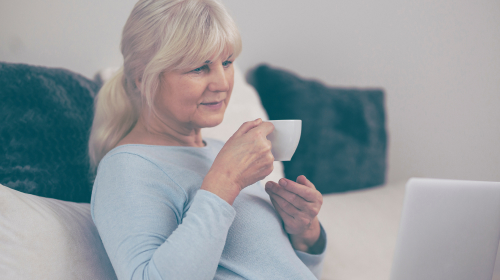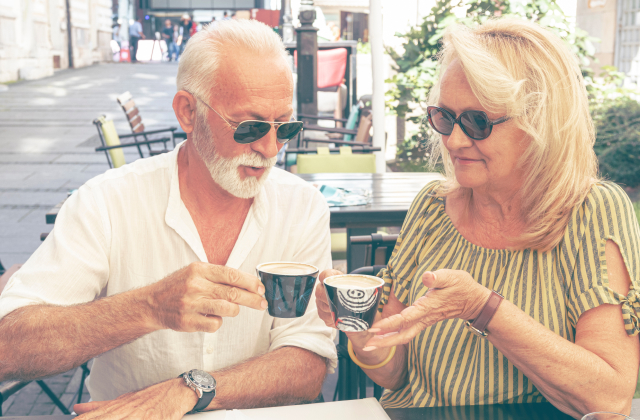The Relationship Between Coffee and Aging: Insights for Seniors
Coffee is a globally cherished beverage, particularly noted for its health implications among older adults.
Coffee Consumption Among the Elderly
A notable trend is observed in seniors drinking coffee. This group frequently ranks coffee as a primary drink, highlighting its popularity next to water and tea. Observations of seniors drinking coffee at local community centers or cafes underline its widespread acceptance and comforting presence across various cultures.
When exploring what seniors drink, coffee invariably appears at the top of the list. The adaptation towards seniors coffee that is gentler on the stomach and contains less caffeine is particularly important as it aligns with the dietary adjustments necessary at senior coffee age. The selection of the coffee blend and brewing method is thus crucial in optimizing the beverage for elderly consumers.

The Effects of Coffee on the Aging Process
Research on coffee and ageing shows mixed outcomes. While moderate coffee consumption has been linked to protective benefits against cognitive decline, there are concerns about caffeine aging, with some studies suggesting that high levels might exacerbate health issues. This raises the pivotal question: does coffee make you age? Evidence points to caffeine influencing metabolic and stress responses, which can have dual effects on the aging process.
Benefits and Potential Risks of Coffee for the Elderly
Coffee’s bioactive compounds, such as chlorogenic acids and melanoidins, are known for their anti-inflammatory properties and their role in cellular protection from oxidative stress. This could potentially lower the risk of age-related diseases like type 2 diabetes and heart disease. Additionally, the ritual of drinking coffee can provide psychological benefits, creating a comforting routine that offers mental stimulation and opportunities for social interaction, especially in senior coffee circles.
However, the well-known stimulant caffeine can enhance brain function, leading to better attention, alertness, and cognitive function, which are particularly beneficial as concerns about cognitive decline increase with age. Nonetheless, it’s vital for seniors to manage their caffeine intake carefully, as too much can cause sleep issues and restlessness.
Selecting the Right Coffee for Seniors
Seniors coffee choices often include decaffeinated or lighter roast options to ease digestion and reduce potential irritants. This thoughtful selection is key to making coffee a beneficial part of seniors’ daily routines, contributing positively to their overall health without overburdening their systems.
For those looking to support their senior loved ones in enjoying a rich and fulfilling lifestyle, invite you to explore the care programs offered by the Angel Care agency in New York. These programs are designed to enhance the quality of life for seniors, helping them enjoy their golden years in health and happiness.

In the realm of home care, making the right choice for yourself or a loved one can be a daunting task. With options like the Consumer Directed Personal Assistance Program (CDPAP) and traditional home care, understanding the nuances of each is crucial. This article aims to dissect the differences between CDPAP and traditional home care, weigh the pros and cons of each, and offer guidance on how to make an informed decision based on individual needs. Additionally, we will explore how CDPAP is reshaping the home care industry. Understanding the Differences Between CDPAP and Traditional Home Care At its core, the distinction between CDPAP and traditional home care lies in the level of control and flexibility offered to the care recipient. Traditional Home Care: This model involves receiving care from professional caregivers employed by a home care agency. These caregivers are typically licensed and trained to provide a range of services, from personal care to medical assistance, depending on their qualifications. CDPAP: This New York State Medicaid program allows care recipients to hire, train, and direct their own caregivers. Interestingly, the caregivers can be family members or friends, excluding spouses or designated representatives. This model emphasizes a personalized, consumer-directed approach to care. Pros and Cons of CDPAP Pros: Personalization and Comfort: With CDPAP, care recipients can choose caregivers they trust and are comfortable with, enhancing the personalization and comfort level of the care provided. Flexibility: CDPAP offers more flexibility in terms of scheduling and services. Caregivers can perform a wide range of tasks, including nursing and medical tasks, after appropriate training. Empowerment: It empowers individuals by giving them direct control over their care, leading to potentially higher satisfaction. Cons: Administrative Responsibilities: The care recipient or their representative must manage payroll, tax, and other administrative tasks. Limited Availability: CDPAP is a Medicaid program and is not available to those not eligible for Medicaid. Also, it's specific to certain states, like New York. Pros and Cons of Traditional Home Care Pros: Professionalism and Training: Caregivers are professionally trained and licensed, ensuring a high standard of care. Less Administrative Burden: The home care agency handles all administrative tasks, including payroll, taxes, and scheduling. Backup Care: Agencies typically offer backup caregivers in case the primary caregiver is unavailable. Cons: Less Personal Control: Care recipients have limited say in choosing their caregiver and scheduling their hours. Cost: It can be more expensive than CDPAP, especially if not covered by insurance or Medicaid. How to Choose Between CDPAP and Traditional Home Care Choosing between CDPAP and traditional home care depends on individual circumstances, including medical needs, personal preferences, and financial considerations. Here are some factors to consider: Level of Comfort and Trust: Do you prefer a caregiver who is a family member or friend, or a professional from an agency? Willingness to Manage Administrative Tasks: Are you or a family member willing and able to handle the administrative responsibilities that come with CDPAP? Financial Considerations: Assess the costs and your eligibility for Medicaid or other insurance coverages. How the CDPAP is Impacting the Home Care Industry CDPAP is significantly impacting the home care industry by introducing a consumer-directed approach. It's compelling traditional agencies to reconsider their models and adapt to a landscape where personalization and consumer control are increasingly valued. The program is also highlighting the importance of flexible, tailored care plans that meet the unique needs of each individual. Choose your in-home care with Angel Care ink. Deciding between CDPAP and traditional home care is a deeply personal choice that hinges on specific needs, preferences, and circumstances. By understanding the pros and cons of each, assessing your personal situation, and considering the evolving landscape of the home care industry, you can make a decision that best supports your or your loved one's health, well-being, and independence. No matter what you choose for yourself or your loved one, finding a trusted home care agency that truly cares about its patients is crucial. Angel Care Inc. is here for you. Start your new life with us today. Contact our manager to learn more about your opportunities.

Paranoia is a complex psychological condition that tends to be particularly impactful in the elderly. As we age, the onset of paranoia in the elderly can be both distressing and disorienting, affecting daily life and relationships. Understanding what causes extreme paranoia in the elderly is crucial for providing appropriate care and support. Geriatric paranoia often stems from a combination of physiological and psychological factors. Changes in the brain due to aging can impair perception and thinking, leading to heightened suspicions. Additionally, elderly paranoia can be exacerbated by social isolation, the loss of loved ones, or the fear of dependency. Environmental factors such as reduced mobility or chronic pain can further complicate feelings of vulnerability and mistrust among the elderly. Signs of paranoia in the elderly When discussing paranoia in senior, it's important to know these may include irrational fears about harm or betrayal, reluctance to socialize, and misinterpretation of conversations or events. Particularly, paranoia in elderly women might be influenced by their unique life experiences or particular vulnerability due to societal roles. The complexity of these symptoms often requires a sensitive approach to understand and manage their fears appropriately. The symptoms can vary, and in the case of paranoid senior, you might observe behaviors like hoarding items, believing they are being spied on, or expressing unwarranted hostility towards caregivers or family members. This is often a manifestation of elderly and paranoia, where fear and anxiety dominate their thoughts. What causes paranoia in the elderly? Paranoia can also include medical conditions such as dementia, Alzheimer's disease, or side effects from medications. It’s vital to consult healthcare providers to understand the underlying causes and to differentiate between paranoia and possible medical issues. The phenomenon of senior and paranoia does not just involve fear but can lead to significant challenges in managing everyday interactions. Caregivers and family members need to be equipped with the right tools and knowledge to handle paranoid elderly. Treatment for paranoia in elderly involves a mix of medical management, counseling, and compassionate support. Adjusting the living environment to make it safer and less confusing can help reduce feelings of threat. Social support is also crucial in alleviating feelings of isolation that may contribute to paranoia. Engaging in structured activities can also provide a sense of purpose and community for the elderly, potentially reducing paranoid thoughts. For anyone dealing with paranoid loved ones, it’s important to seek out programs and resources that can offer support and guidance. You can explore the website available on our website, designed to assist families and caregivers in managing these challenges effectively. Let's help our loved ones not just survive, but thrive in their golden years. Visit our website Angel Care to learn more about how we can support you and your family during these challenging times.



